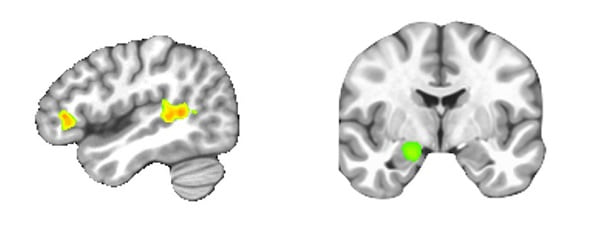New MRI Study: Reduced Threat Responsiveness Corresponds with Aggressive Behavior
Tuesday, August 24, 2021
In a first-of-its-kind study, researchers at Boys Town National Research Hospital Center for Neurobehavioral Research have linked reduced threat and reduced emotional responsiveness to recorded aggressive behavior in researched adolescents during their first three months in the Boys Town residential setting.
Previous studies have attempted to examine relationships between brain responses and self-reported aggression. But this study is the first to have an
objective (observed and recorded) measure of aggressive incidents, as judged by trained Family-Teachers® in the Boys Town program.

Researchers used images of human and animal figures that were neutral or aggressive to measure threat or emotional response.
Researchers recruited adolescents shortly after arrival at the Boys Town residential program and measured their threat and emotional response to pictured human and animal figures that were neutral or aggressive as they loomed toward or moved away in the adolescent's field of view. The responses were recorded using an MRI scanner and looking at the reactions in segments of the brain, including the inferior frontal gyrus and the amygdala. Those brain responses were then related to the number of aggressive incidents shown during the first 3 months of stay at Boys Town.
Many factors can make a child/adolescent more prone to aggressive behavior, including economic deprivation, poor parenting, maltreatment and even ADHD. But this study looks beyond those factors to neurocognitive dysfunctions that may make an individual more inclined to aggression. The reduced reaction to threat and reduced emotional responsiveness directly (as measured in
Magnetic
Resonance
Imaging) correlated to increased recorded episodes of aggressive behavior.
The researchers hypothesized two potential reasons for this increase. The first being a lack of ability to formulate the consequences of aggressive acts and the second may be related to reduced empathetic responsiveness. Though that wasn't part of this study, the underlying architecture for threat is the same as that for empathy.

The responses were recorded using an MRI scanner and looking at the reactions in segments of the brain, including the inferior frontal gyrus and the amygdala.
“What we clearly do show in this study is that lack of emotional response or reduced response to threat is a risk factor," said Dr. James Blair, Ph.D., one of the researchers and the Director of the Center for Neurobehavioral Research. “And we can understand why it is a risk factor with respect to poor decision making and corresponding empathic issues."
Asked about the future of this study and its findings, Dr. Blair stated, “We need better risk assessment tools – for aggression, self-harm and other mental health concerns. This study is an early step in developing the next stage of assessment tools for aggression risk."
To learn more about the study and its findings, go to:
10.1093/scan/nsab058
